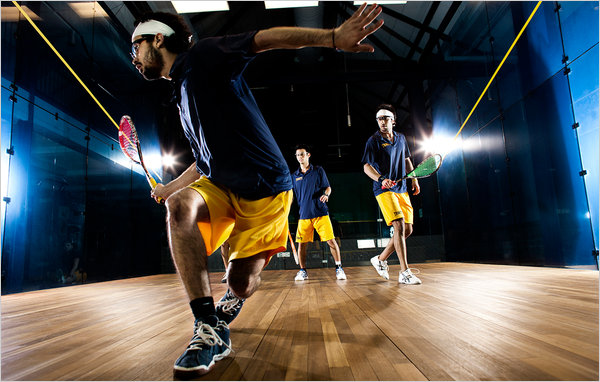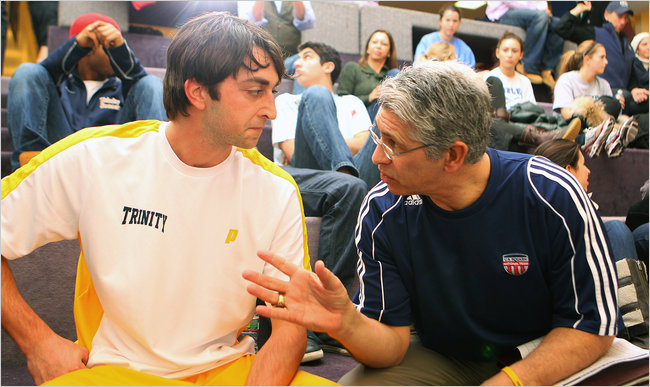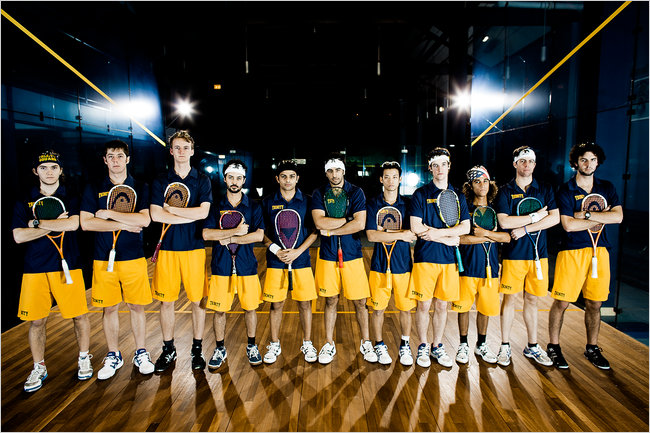

From left: Andres Vargas (from Colombia), Randy Lim (from Malaysia) and
Vikram Malhotra (from India).
One day in 1996, Trinity College’s new president, Evan Dobelle, called the men’s squash coach into his office. Dobelle was an unconventional hire. He didn’t complete his bachelor’s degree until he was 39, working in politics – mayor of Pittsfield, Mass., aide to President Carter, treasurer of the Democratic National Committee – then running first one, then another community college. But Trinity was a troubled institution, and the trustees weren’t looking for another tweedy scholar. Enrollment was down even as the liberal-arts school was accepting 65 percent of all applicants – a striking contrast to its rivals Amherst and Williams, which typically admit fewer than 20 percent of their applicant pools. The biggest problem was Trinity’s immediate surroundings, the crime-ridden, blighted neighborhood of Frog Hollow in Hartford. So Dobelle started an ambitious $225 million public-private urban-renewal project to improve the area – including the construction of three schools and a performing-arts center – without pushing its residents out. Then he turned to the college’s sports programs, wondering if there might not be a quicker way to improve Trinity’s brand.

Streak Maker The Trinity coach, Paul Assaiante, right, with
Wesley Wynne, a senior on the team, which has won 239 straight matches.
The obstacle there was that Trinity is a Division III school, and in Dobelle’s view, winning a basketball championship, say, against an obscure college in the Midwest wouldn’t make much of a splash. Trinity had a squash team, however, and even if the sport wasn’t played everywhere, at least the school competed against Harvard, Yale and Princeton, elite universities known throughout the world. Beating them in anything would be big news. It was still easier said than done, though: no school outside the Ivy League had won the Potter Cup, given to the men’s national champion in college squash, since the U.S. Naval Academy’s surprise victory in 1967.
Dobelle asked his squash coach, Paul Assaiante, what it would take to compete with the Ivies.
Dobelle didn’t know it at the time, but Assaiante’s path to Trinity was as improbable as his own. A working-class kid from the Bronx, Assaiante competed in gymnastics at Springfield College in Massachusetts and coached the sport at the U.S. Military Academy. During his downtime there he took up tennis, became an accomplished player and applied as a lark when Army’s tennis-coaching job opened up. When other candidates turned down the job after finding out they would have to lead cadets on mandatory early-morning runs, Assaiante got the position in 1977 – and the added duty of coaching the squash team. He learned the sport quickly, moving on to coach it at Williams and then private clubs before landing the Trinity job in 1994.
So when Dobelle posed his question, Assaiante had been around squash long enough to know how to change the preppy American face of the sport. Recruit foreign players, he said, without skipping a beat.
It has been 15 years since that short conversation, at which Dobelle gave Assaiante the go-ahead to canvass the globe for players. Dobelle is now the president of Westfield State University in Massachusetts, but Assaiante is leading Trinity’s squash team into the national-championship tournament later this week at Harvard as a favorite to win its 13th consecutive title. And if, after this article goes to press, Trinity gets past Princeton and Brown, there will be another streak on the line, too – The Streak. Over the last dozen years, Trinity has not lost a single match to another school. At 239 matches and counting, as of this writing, it’s the longest winning streak, by far, in the history of college sports.
Trinity opened its 2010-11 season at Williams in December. As the first snowflakes of winter fell on the campus in Williamstown, Mass., the home team was being pummeled inside the squash center. Down two games to none in a best-of-five match, Will Morris, Williams’s top player, slumped against a water fountain and conceded to a teammate, “I’m tired,” as his opponent, Trinity’s Parth Sharma, casually practiced a few shots on court, barely sweating.
Morris matriculated from St. Paul’s, the New Hampshire boarding school that built the country’s first squash court in 1884. His teammates were from Exeter, Choate and other top prep schools; 20 years ago Williams’s roster would have been the envy of any school in the country. Today, against Trinity, it didn’t stand a chance. Trinity started only one American, Travis Judson, a senior, in its nine-man lineup. Sharma was from Jaipur, India – he attended a squash academy in Chennai before Trinity – and behind him was a fellow countryman as well as players from Sweden, South Africa, Malaysia, Colombia, El Salvador and Jamaica.
What Assaiante understood in 1996 and what remains the case is that the United States isn’t very good at squash. (The highest-ranked male American pro is No. 40: Julian Illingworth, a Yale graduate.) In part, that’s because until the last 15 years or so, Americans played a different version of the game, one that employed a harder ball and smaller court. Also, in many other parts of the world, more people are able to play; squash isn’t an upper-class sport. “I grew up in a middle-class, maybe working-class, family,” says Martin Heath, the Scottish coach at the University of Rochester, who was once ranked No. 4 in the world. “In Europe, you didn’t need to belong to a country club to play the game.”
At the beginning of Sharma and Morris’s match, each player was conservative. Occasionally, each sent drop shots to the front corners – not so much in order to win the point outright, however, as to tire his opponent. Squash is like sex, Assaiante likes to say: the object is to make it last as long as possible, wear the other person out. As in tennis, a point ends when the ball bounces twice or is struck out of bounds. But a squash court is small, a 672-square-foot box, and a good player who’s not terribly out of position should be able to reach any ball.

Trinity College stocked its squash team with foreign players. And the winning
began.
Morris wasn’t used to playing the game at Sharma’s tempo. “He forces the pace, and you can’t slow it down,” Morris said after the match. As the errors mounted for Morris, Sharma opened up his bag of trick shots. Lining up to hit a backhand into the front-right corner, he instead played it to the left with a deft flick of the wrist that wrong-footed Morris. “My favorite part of the game is the deception,” Sharma told me later. “I like finding new ways to trick my opponent.”
When Sharma finished off Morris, he completed a 9-0 romp for Trinity over the No. 11 team in the country. Only Trinity’s No. 5 player, Christopher Binnie from Jamaica, surrendered a game.
Trinity’s first international recruit was Marcus Cowie, from Norwich, England. Just out of high school and already ranked among the world’s top 100 squash professionals – he deferred prize money that would have put him afoul of N.C.A.A. regulations – Cowie first attracted the interest of Harvard’s coach, Bill Doyle. But the admissions department turned him down, and Doyle, a Trinity alumnus, put him in touch with Assaiante. “Trinity made a tremendous pitch,” says Cowie, who hadn’t heard of the college until Assaiante called. He met with Dobelle and was courted by Luke Terry, a Trinity graduate who served at Credit Suisse’s London offices. Assaiante took him to a Red Sox game.
When he arrived on campus in the fall of 1996, Cowie was instantly the best college player in the country; he went on to win the individual intercollegiate championships as a freshman and sophomore. In 1999, Trinity beat Harvard for the first time, in front of 2,000 spectators at home. “It was so crowded that when I broke a string, I couldn’t push the door open to get another racket,” Cowie recalls. “It was match ball, and I won that last point with broken strings.” Later that year, Trinity beat Harvard again to win its first national championship, ending Harvard’s own run of eight consecutive titles. Seven international players were on that Trinity squad.
Other schools have had international recruits, but never in such numbers, and there have been chirps about Trinity’s mercenary approach inside genteel squash circles. In 2004, The Harvard Crimson wrote – erroneously – that the “Evil Empire of College Squash” was handing out athletic scholarships, something schools in the Ivy League and the New England Small College Athletic Conference (which Trinity belongs to) are not allowed to do. “The feeling was that if you beat Harvard, you had to be cheating,” Assaiante says.
Trinity does enjoy one significant recruiting advantage: lower admission standards. “The kids that play squash for Trinity could not get into Williams (and Harvard, Yale and Princeton),” Zafi Levy, Williams’s coach, told me by e-mail. (Levy, who is from Israel, played for Assaiante at Trinity and then transferred to Williams.) In some cases, that’s certainly true: Randy Lim, a senior from Malaysia, didn’t get into Princeton, for example. What’s more, Trinity’s admissions office, with support from the president, is able to give more slots to squash players than its competitors do. As the Yale coach David Talbott puts it, “At Yale, where sports aren’t the emphasis, the president isn’t going to put that much focus on any sport.”
Still, if Trinity focuses more on squash than other sports, that’s well within the rules set down by the N.E.S.C.A.C., which permits Trinity to devote 71 spots annually to athletes who would not be likely to gain admittance. Schools are free to divvy the slots among the sports as they like. (The Ivy League’s numbers are not as transparent.) “What I say to the critics is that we’ve never tried to pretend we’re Harvard or Princeton,” Assaiante says, adding that he’s proud of his team’s academic record. During his tenure, only one player has failed to graduate, and that student returned to his home overseas for financial, not academic, reasons.
But by now, the Ivies, too, have filled their ranks with international players. Assaiante’s scouting advantages – he coaches the U.S. national team and is also tipped off by the vast web of Trinity squash alumni now scattered around the world – have been mitigated by the rise of the Internet, which makes it easy for anyone to track junior results in Lahore and Cairo.
“When we played Trinity in the national championship last year, they had nine international players in their top nine, and we had seven,” Talbott says. Nearly all students will still choose an Ivy League university over Trinity when they can get in. “Of the top eight squash teams, five are in the Ivy League,” Bob Callahan, Princeton’s coach, says. “That’s what’s unique about the sport. You can access the best education in the country and still play at the highest level.”
Meanwhile, schools with less lofty admissions standards, including the University of Rochester (ranked No. 4) and Franklin & Marshall (No. 8), are catching up to Trinity by following its model.
Trinity’s home match against Yale in mid-January was the most anticipated of this season. Last year, Trinity beat Yale 6-3 to win its 12th national title. And it was a contest that briefly captured the nation’s attention, thanks to some histrionics involving the teams’ No. 1 players. After the final point, Baset Ashfaq Chaudhry, a Trinity senior from Pakistan, who stands 6-foot-5, ran to his Yale counterpart, Kenneth Chan, who’s a foot shorter, leaned over him and let out a primal scream. The footage was broadcast on SportsCenter and went viral online, but ESPN didn’t show the moment earlier in the match when Chan made a similar unsporting gesture. Ashfaq apologized and later withdrew from the singles championship, but Trinity’s phone lines were deluged with angry calls, and the incident did little to diminish Trinity’s image as the bully of college squash.
Chan was playing at No. 2 this year, as was Sharma, who lost a challenge match to a teammate and countryman, Vikram Malhotra, who was now No. 1 for Trinity. But the biggest shake-up wrought by challenge matches was the arrival, for the first time in several years, of two Americans in Trinity’s top nine, both graduates of the Brunswick School in Greenwich, Conn.: Judson was at No. 8, and a freshman, Matthew Mackin, was No. 9. Behind them were another dozen or so Americans, affectionately called the “bomb squadders” by Assaiante, who doesn’t divide his team into varsity and junior-varsity squads. Instead, he inserts lower players into the lineup against weaker teams.
It’s a philosophy that endears Assaiante to parents of all nationalities. “I kept thinking there has to be something fake about this guy, but I never found it,” says the author Tom Wolfe, whose son played for Trinity and who gave a party to celebrate Assaiante’s recently published memoir, “Run to the Roar.”
When Sharma and Chan took the court, Trinity led the match 2-1; Andres Vargas, from Colombia, and Antonio Diaz, from Mexico, eked out close victories for Trinity, while Mackin lost to Yale’s Robby Berner, another Brunswick alumnus. Berner liked his team’s chances. “We were close last year, and they graduated a lot of players,” he said.
Sharma and Chan split the first two games. The third game, and the match, tilted on an epic rally with Sharma leading 6-5. Three times Chan dove to the floor, barely able to flick the ball toward the front wall. Finally, Chan couldn’t pull himself up in time, and Sharma whacked the ball to the open court. Sharma closed out that game and pulled away in the fourth.
On another court, Johan Detter, a Swede, avenged a junior-circuit loss to Yale’s Neil Martin, from Ireland, and Binnie recorded Trinity’s fifth win, clinching the match. Trinity would end up prevailing 7-2, with Judson accounting for the second loss. Yale’s Berner told me that it augurs well for American squash that two homegrown players have cracked Trinity’s lineup – but he didn’t mention that they were responsible for Trinity’s two losses.
All streaks come to an end. “The mathematical odds are so acutely against any continuation ad infinitum of such a historic feat,” James Jones Jr., Trinity’s current president, says. In December, the University of Connecticut’s women’s basketball team broke the U.C.L.A. men’s basketball record of 88 consecutive victories, but then, just two games later, fell to Stanford. In his comments immediately after the game, Connecticut’s coach, Geno Auriemma, smiled, praised the Stanford women and said he would probably appreciate his team’s run all the more now that it had ended.
“Losing is a disease,” the New York Knights’ clubhouse psychologist says in the baseball movie “The Natural.” But winning also carries its own heavy burden. As a Trinity freshman, Gustav Detter, Johan’s older brother, took the court against Princeton in February 2006 with the match tied at 4. He was facing a senior, Yasser el-Halaby, widely considered to be the best player in the history of college squash. Coming back from a two-game deficit, Detter pulled off a miraculous upset. He fell to the court and raised his arms in ecstasy. Two years ago, however, when Detter was a senior and pulled out the match in a similar situation, he felt only relief. “I played that match with a completely different feeling, a fear of losing and letting the team down,” he told me.
Of course, Assaiante is attuned to this feeling, this burden. “The streak motivates them, it spurs them on, and it paralyzes them,” he says of his players. He says he is prepared for the day his team loses, that he has rehearsed many times the speech he’ll give. He pictures the match ending 5-4, with the Trinity player who loses the deciding match walking off the court, head down.
“First of all, I’ll ask the five players that lost to raise their hands,” Assaiante says. “I’ll say: ‘All of you lost a point today. You lost the same number of points as the last man on the court. So Johnny, you have nothing to hang your head about.’ ”
He’ll invite the team to dinner, where he’ll assure his players that “nothing has changed,” certainly not how he feels about them or how they feel about one another.
But first, before the team leaves the courts, Assaiante wants to do something else. “I’m going to dance,” he says. “And then I’ll yell, ‘Yippee!’ ”